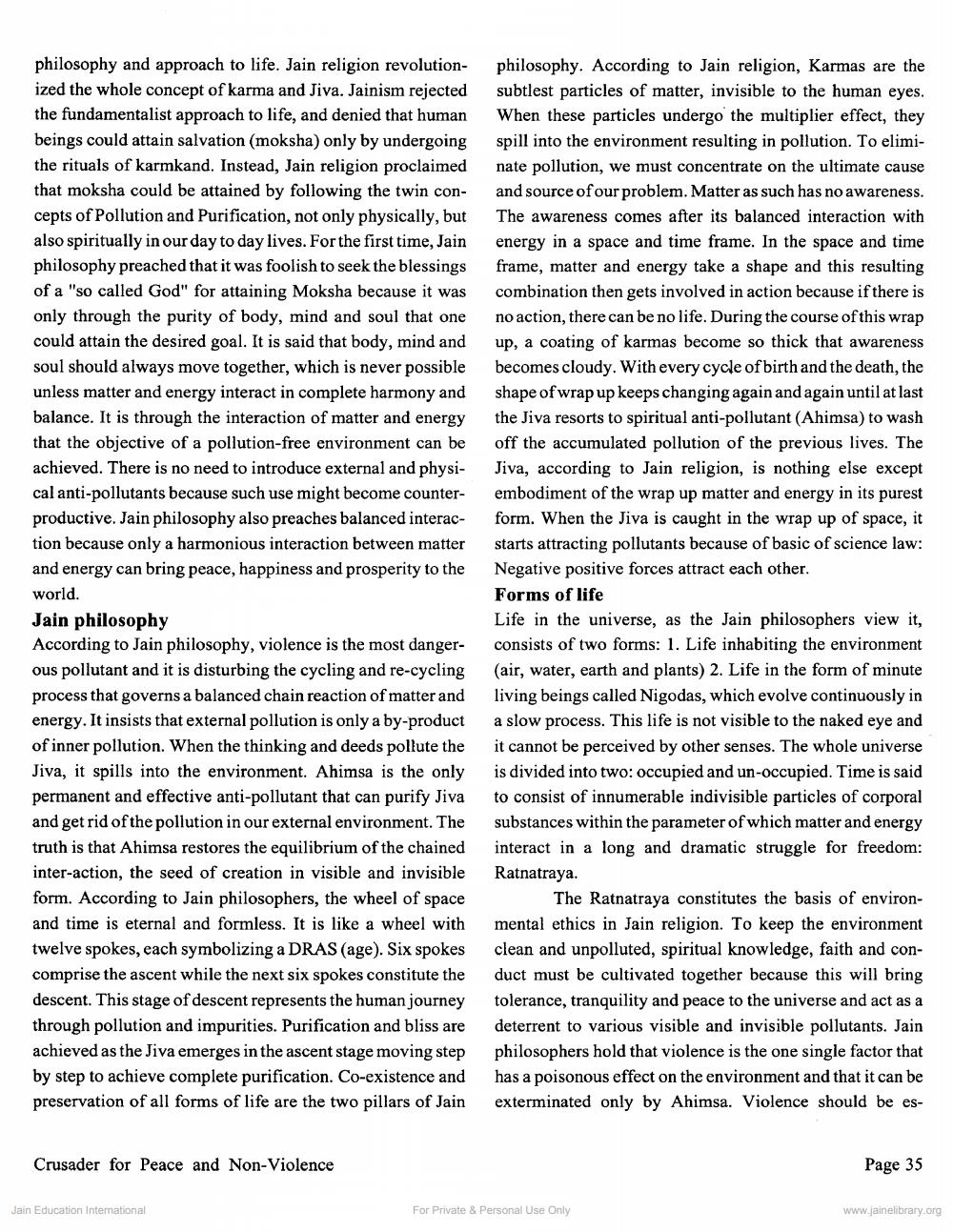________________
philosophy and approach to life. Jain religion revolutionized the whole concept of karma and Jiva. Jainism rejected the fundamentalist approach to life, and denied that human beings could attain salvation (moksha) only by undergoing the rituals of karmkand. Instead, Jain religion proclaimed that moksha could be attained by following the twin concepts of Pollution and Purification, not only physically, but also spiritually in our day to day lives. For the first time, Jain philosophy preached that it was foolish to seek the blessings of a "so called God" for attaining Moksha because it was only through the purity of body, mind and soul that one could attain the desired goal. It is said that body, mind and soul should always move together, which is never possible unless matter and energy interact in complete harmony and balance. It is through the interaction of matter and energy that the objective of a pollution-free environment can be achieved. There is no need to introduce external and physical anti-pollutants because such use might become counterproductive. Jain philosophy also preaches balanced interaction because only a harmonious interaction between matter and energy can bring peace, happiness and prosperity to the world.
Jain philosophy
According to Jain philosophy, violence is the most dangerous pollutant and it is disturbing the cycling and re-cycling process that governs a balanced chain reaction of matter and energy. It insists that external pollution is only a by-product of inner pollution. When the thinking and deeds pollute the Jiva, it spills into the environment. Ahimsa is the only permanent and effective anti-pollutant that can purify Jiva and get rid of the pollution in our external environment. The truth is that Ahimsa restores the equilibrium of the chained inter-action, the seed of creation in visible and invisible form. According to Jain philosophers, the wheel of space and time is eternal and formless. It is like a wheel with twelve spokes, each symbolizing a DRAS (age). Six spokes comprise the ascent while the next six spokes constitute the descent. This stage of descent represents the human journey through pollution and impurities. Purification and bliss are achieved as the Jiva emerges in the ascent stage moving step by step to achieve complete purification. Co-existence and preservation of all forms of life are the two pillars of Jain
Crusader for Peace and Non-Violence
Jain Education Intemational
philosophy. According to Jain religion, Karmas are the subtlest particles of matter, invisible to the human eyes. When these particles undergo the multiplier effect, they spill into the environment resulting in pollution. To eliminate pollution, we must concentrate on the ultimate cause and source of our problem. Matter as such has no awareness. The awareness comes after its balanced interaction with energy in a space and time frame. In the space and time frame, matter and energy take a shape and this resulting combination then gets involved in action because if there is no action, there can be no life. During the course of this wrap up, a coating of karmas become so thick that awareness becomes cloudy. With every cycle of birth and the death, the shape of wrap up keeps changing again and again until at last the Jiva resorts to spiritual anti-pollutant (Ahimsa) to wash off the accumulated pollution of the previous lives. The Jiva, according to Jain religion, is nothing else except embodiment of the wrap up matter and energy in its purest form. When the Jiva is caught in the wrap up of space, it starts attracting pollutants because of basic of science law: Negative positive forces attract each other.
Forms of life
Life in the universe, as the Jain philosophers view it, consists of two forms: 1. Life inhabiting the environment (air, water, earth and plants) 2. Life in the form of minute living beings called Nigodas, which evolve continuously in a slow process. This life is not visible to the naked eye and it cannot be perceived by other senses. The whole universe is divided into two: occupied and un-occupied. Time is said to consist of innumerable indivisible particles of corporal substances within the parameter of which matter and energy interact in a long and dramatic struggle for freedom: Ratnatraya.
The Ratnatraya constitutes the basis of environmental ethics in Jain religion. To keep the environment clean and unpolluted, spiritual knowledge, faith and conduct must be cultivated together because this will bring tolerance, tranquility and peace to the universe and act as a deterrent to various visible and invisible pollutants. Jain philosophers hold that violence is the one single factor that has a poisonous effect on the environment and that it can be exterminated only by Ahimsa. Violence should be es
For Private & Personal Use Only
Page 35
www.jainelibrary.org




